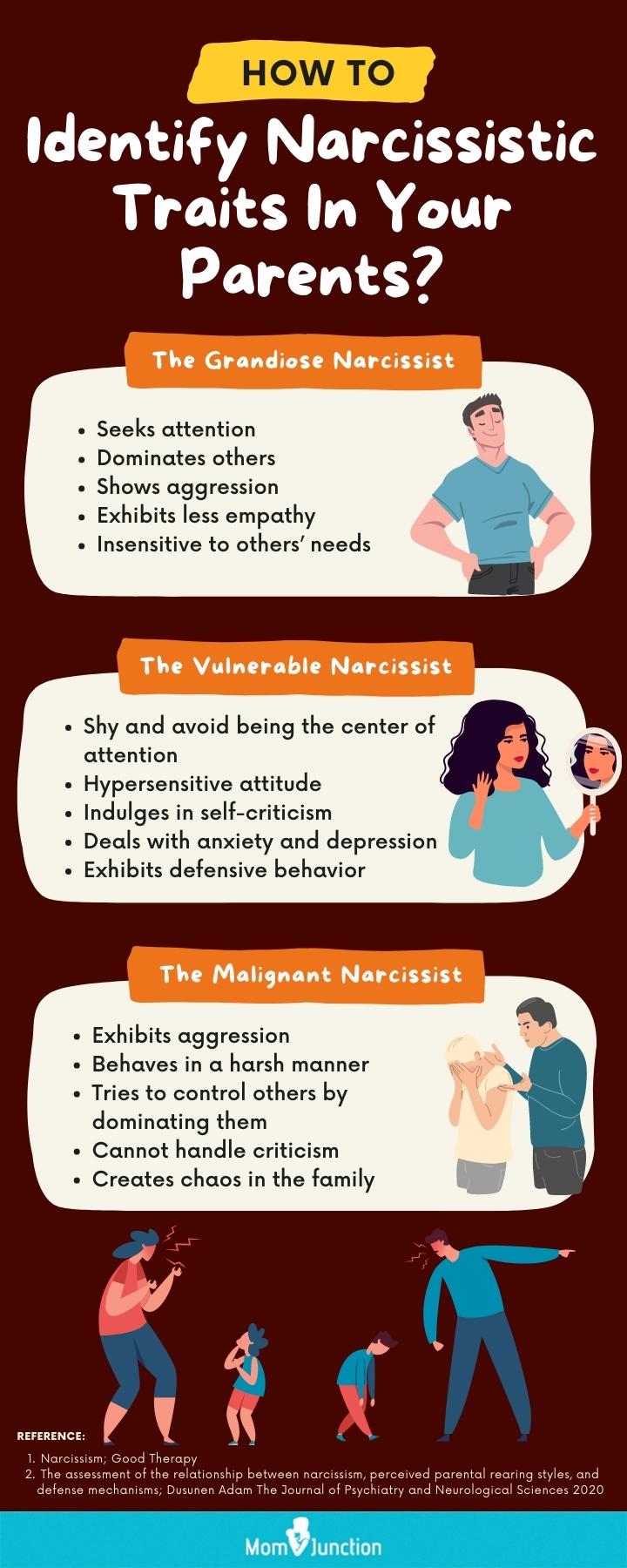
Image: Shutterstock
A narcissistic father may not be able to create a good family environment because they constantly disregard the personal boundaries of everyone else. People with narcissistic personality disorder build a grand self-image and believe to be at the highest level. To distract themselves from their insecurities, they often create a pseudo-personality.
Living with a narcissistic father is difficult because he often may not acknowledge the personal requirements of his children and other family members. He may resort to gaslighting, projection, and scapegoating, which can cause long-term mental trauma to a child. He would even demand special treatment, unlimited power, and importance (1).
Read the post to learn how to identify the characteristics of a narcissistic father and ways to deal with him.
Signs Of A Narcissistic Father
Image: Shutterstock
A narcissistic father perceives the independence of his children as a threat. Here are some more signs explained (2).
1. He has an inflated self-image
A narcissistic father could be self-centered and superficial. His self-centeredness and self-obsessed nature make him develop a superior image of himself and treat people around him merely as tools.
2. He dreams of having power and control
Does he like to assert absolute authority over his children? That’s because he is controlling, demanding and likes to keep an eye on their every little move. He pressurizes children to do things how he wants, even if that causes discomfort.
3. He loves to show others how special he is
He enjoys showing off all the supposed superior dispositions he beholds.A father with narcissistic tendencies displays a self-aggrandizing attitude, brags about his accomplishments, and goes out of the way to flatter himself.
4. He doesn’t take constructive criticism
A narcissistic father has the impression that he has no flaws. Therefore, he believes that he is perfect and can turn back to his children, and even say harsh things to damage them. He often ends up blaming others for his shortcomings.
5. He is driven by ego
His ego means everything to him and he can do anything to keep his ego satisfied, even if it’s hurting someone else’s pride. He reflects a selfish personality and displays a lack of empathy. He does not care about how his conceited, arrogant, and ego-driven behavior affects his children.
 Point to consider
Point to consider6. He wants to live through his child’s life
He dominates over the child’s interests and forces them into doing things that he wants to do in his life, showcasing an autocratic mindset. This may not benefit the child, but his selfishness and egotistical attitude makes him ignore all other facts.
7. He tries to marginalize the child
一个自恋的父亲可能会觉得受到威胁hild’s potential. Hence, he might try to pull them down and draw constant comparisons between himself and the child.
8. He manipulates in his favor
Parental manipulationincludes guilt trips, shaming, blaming, and even negative comparison. For example, if the father lets his children know that love from their side is conditional and has to be earned, it reflects narcissistic behavior.
9. He likes to control
A narcissistic father likes to have complete control and domination over his children. Therefore, he regulates the most insignificant tasks in a rigid manner. And lack of obedience from the child may lead to severe consequences or punishments.
10. He doesn’t empathize
He doesn’t consider his child’s feelings, lacks empathy, and perceives their sensitivity as a sign of weakness.
11. He depends on the child
The relationship between a narcissistic father and his child is that of codependency. The child needs a father until adulthood, while the narcissist father expects his child to take care of him and be at his disposal all the time. Therefore, he wants them to be around and keep helping him when required, even if the child is preoccupied with other tasks.
12. He gets jealous
A narcissistic father cannot accept the child drifting away from his influence.He gets possessive和不安全的,当孩子独立和收益does not need the father’s help anymore.
13. He neglects things
He is self-absorbed in his life. He doesn’t care about his children’s likes or dislikes and goes ahead with whatever he thinks is right.
While some fathers may exhibit a few of the signs, others may show most of the signs while remaining unaware of the impact on the child.
Effects Of A Narcissistic Father On Children
Toxic relationships, such as growing up with a narcissistic father, can damage a child’s self-esteem. It also affects the sense of boundaries they deserve to have in life (2).
- The narcissistic traits and remarks of a father may have a negative and long-lasting effect on children.
- Children maypick up the same traitsas their father as they spend most of their time with him.
- Due to constant criticism and emotional abuse by a narcissistic father, children can get confused about their own identity, thereby resulting inan underdeveloped self-concept.They might consider anything acceptable by the father as right.
- Children of a narcissistic father mayseek validation, love, and support from othersto fulfill the void and criticism made by the father.
- Children brought up in dysfunctional family dynamics with a narcissistic father may have issues maintaining healthy relationships because they are oftentoo insecure and unsure.
Effects On Daughter
Image: Shutterstock
Here are some effects that a narcissistic father may have on his daughter (3).
- Low self-esteemdue to being constantly criticized by the father in damaging ways. They end up disregarding their own needs.
- Feeling insecure in aromantic relationshipas the daughter feels she is not appreciable enough. In fact, they may be attracted to partners who echo the traits of the father as he has been their first male role model.
- Daughters of narcissistic fathers tend to have a low opinion of themselves and feel inadequate and anxious.
Effects On Son
Image: Shutterstock
A narcissistic father may affect his son in the following ways:
- The father’s assertion or the thought that the father is always right makes the sonfeel guilty and wrongwhen a question is raised.
- Growing up with a narcissistic father can make their sontimiddue to constant suppression.
- The terror of a narcissistic father getting angry when things don’t go his way makes the sonobeyeverything, even if he is not comfortable.
- A son of a narcissistic father may grow up to beconfused. Making a difference between wrong and right could be difficult as he has always accepted his father’s wishes.
How To Deal With A Narcissistic Father
Image: Shutterstock
Growing up with a narcissistic father may cause trauma and Post-traumatic Stress Disorder (PTSD) to the child.Healing and recovery from the negative experiences will take time but is not impossible. Here’s how one can mature out of atoxic relationshipwith their father.
- Accept that his behavior is unhealthy
The first step is to accept the fact that the father behaves abnormally. Acknowledging the issue enables the child to gain more insight into the father’s life. It may also make them more empathetic towards the father’s situation and accept him the way he is.
- Be assertive about having your space
Setting boundaries is extremely important, especially because narcissists violate personal boundaries frequently and with impunity. The child has to take a stance and be firm about the boundaries they want to maintain with their narcissistic father. Having some time away from their father can help them clear their head and lift off the emotional and mental burden they have.
- Resist being manipulated
Being manipulativeis one of the foremost tricks of a narcissistic father to get what he wants from the child. To avoid this, the child has to accept that they cannot always fulfill their father’s wishes. Instead, they should focus more on themselves.
- Make self-care your priority
Since the child has not received warmth and love from the father, they should go for self-compassion. For instance, taking up more activities that they like or having their space can be therapeutic and self-loving.
- Allow yourself to move on
土著居民的接受情况和教育自己ut the issue is a mature approach to overcome self-doubt. The child should understand that anything they do will not suffice to the father’s satisfaction, and their cycle continues. Thus, accepting things the way they are helps the child to move ahead in their life. Explain to the child to avoid retaliating as speaking anything that can cause narcissistic injury to their father as it can only make the situation worse.
- Seek professional help
The trauma of living with a narcissistic father fosters and grows unprocessed problems in the long run. Children can seek therapy to run across their thoughts for self-improvement.
Children of narcissistic fathers are prone to long-lasting behavioral problems. They are more vulnerable due to the trauma they have been exposed to. Hence, a regular strategy followed by therapy is required to balance unpleasantness between the father and children. Children may also need more guidance from outside sources, such as a therapist to learn problem-solving techniques. Cognitive-behavioral therapy for children helps to reduce depression and stress and makes them achieve a better mental balance (4).
 Point to consider
Point to considerHow To Protect A Child From A Narcissistic Father
Image: Shutterstock
A narcissistic father may not hurt his children physically but has a major psychological impact on them. Here are some ways a mother or an adult can protect a child from a narcissistic father (5).
- Impart knowledge to the people who surround the child, such as teachers, peers, or house help, so the child gets more space and alone time.
- Let the child know that they can talk to you. Ask them if they would like to see a therapist or anyone else they want to talk to.
- Educate the child aboutnarcissistic personalitydisorder and guide them on how to define boundaries.
Being raised by a narcissistic father is very traumatic and impacts a child’s emotional, mental, and psychological well-being if left untreated. Thus, seeking professional help at the earliest may help reduce the effect of growing up around a narcissistic father.
Frequently Asked Questions
1. Can a narcissist be a good dad?
A narcissist is extremely self-centered and unempathetic. They have difficulty understanding and managing attachment and responsibility. Since they like exercising control through intimidation and threats, their prospects of being good parents are quite low.
2. How does a narcissist treat their child?
Narcissistic parents see their children as idealized versions of themselves. They treat them the way they want to be treated. Praises and accolades boost their ego; hence, they directly or indirectly pressure their children to outperform in every aspect of their lives. They strongly dislike failures and criticisms and ensure their children understand this. If they feel their children aren’t doing as said, they may use emotional manipulation, verbal abuse, and/or physical abuse to get what they want.
一个自恋的父亲可能会创建一个混乱的家庭environment because he may disregard others and be egoistic. He may also like to gain control over children and manipulate them according to his wishes. Children growing up with a narcissistic father may develop low self-esteem, timid personalities, and inadequacy. To deal with such a situation, you should accept reality, resist being manipulated, and allow yourself to break free from the environment. Develop self-love and spend time doing things that make you happy. If being with a narcissistic father is worrisome, you may seek professional help.
Infographic: Different Types Of Narcissistic Parents And Their Characteristics
Narcissistic parents react differently to different stimuli, exhibiting unique characteristics. Knowing these characteristics will make it easier for you to recognize and deal with one. This infographic sheds light upon the different types of narcissistic parents based on their traits.

Illustration: Momjunction Design Team
Get high-quality PDF version by clicking below.
Download Infographic
Key Pointers
- Narcissistic parental behavior can cause psychological problems in children.
- Dominating kids’ interests and staying indifferent to their feelings are a few signs of a narcissistic father.
- Look for more of these characteristics and confide in a trusted confidant, such as your mother, to vent.
- Learn positive coping skills to manage your mental health and stay positive.
References:
- E. L. Kacel, N. Ennis, and D. B. Pereria; 2017; Narcissistic Personality Disorder In Clinical Health Psychology;
https://www.ncbi.nlm.nih.gov/pmc/articles/PMC5819598/ - B. N. Bach; 2014; The Impact Of Parental Narcissistic Traits On Self-Esteem In Adulthood;
https://scholarworks.smith.edu/cgi/viewcontent.cgi?article=1922&context=theses - Women With Narcissistic Parents;
https://adaa.org/learn-from-us/from-the-experts/blog-posts/consumer/women-narcissistic-parents - Kafka’a Remarkable Letter To His Abusive And Narcissistic Father
https://www.brainpickings.org/2015/03/05/franz-kafka-letter-father/ - 5 Ways To Help The Child Of A Narcissist
https://www.btr.org/5-ways-to-help-child-of-narcissist/






















